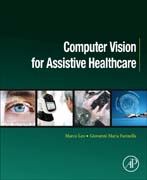
Computer Vision for Assistive Healthcare describes how advanced computer vision techniques provide tools to support common human needs such as mental functioning, personal mobility, sensory functions and daily living activities. It describes how computer vision techniques - such as image processing, pattern recognition, machine learning and Language Processing and Computer Graphics- can cooperate with Robotics to provide such tools. The range of application areas covered are: Mental functioningPersonal mobilitySensory functionsDaily living activities The reader will learn: What are the emerging computer vision techniques for supporting mental functioning and to develop a Socially Assistive Robot (SAR)The algorithms for analysing human behaviour beginning with visual data derived from environmental and wearable sensors ('first person vision')How smart interfaces and virtual reality tools lead to the development of advanced rehabilitation systems able to perform human action and activity recognition using vision based techniques allowing a natural interaction experienceHow Robotics Agent Coachers that can assist people with movement disorders during the execution of motor exercisesThe technology behind intelligent wheelchairsHow computer vision technologies have the potential to assist blind people to independently access, understand, and explore the environments (both indoor and outdoor)Computer vision-based solutions recently employed for safety and health monitoring: Fall detection, life log, and vital parameter monitoring The first book to give the state-of-the-art computer vision techniques and tools for assistive healthcareBroad range of topic areas ranging from Image processing, pattern recognition, machine learning to robotics, natural language processing and computer graphicsWide range of application areas ranging from mobility, sensory substitution, safety and security, to mental and physical rehabilitation and trainingWritten by leading researchers in this growing field of researchContains pieces of codeDescribes the outstanding research challenges still to be tackled, giving researchers good indicators of research opportunities INDICE: 1. Computer Vision to see 2. Computer Vision for Cognition 3. Computer Vision for physical rehabilitation and training 4. Computer Vision for CADsystems in surgery 5. Computer Vision for human-machine interaction 6. Computer Vision for Ambient Assisted Living 7. Egocentric (first person) vision 8. Augmented and alternative communication 9. Life logging 10. Vision for Social and Affective Robotics 11. Computer Vision for Safety and Security Visual Question Answering
- ISBN: 978-0-12-813445-0
- Editorial: Academic Press
- Encuadernacion: Rústica
- Páginas: 385
- Fecha Publicación: 01/04/2018
- Nº Volúmenes: 1
- Idioma: Inglés
